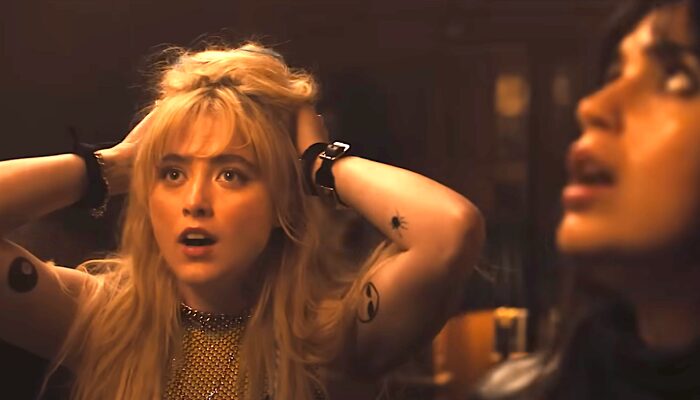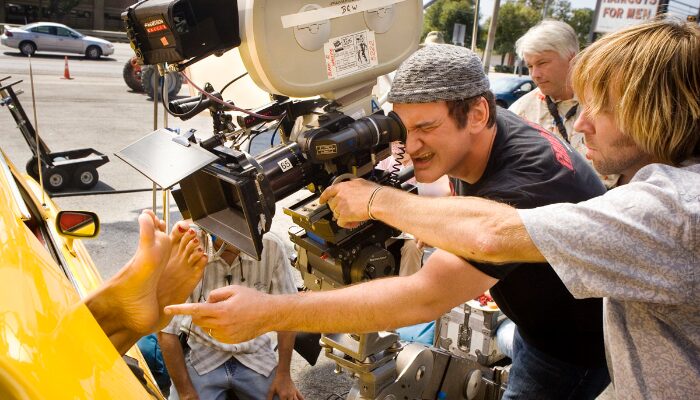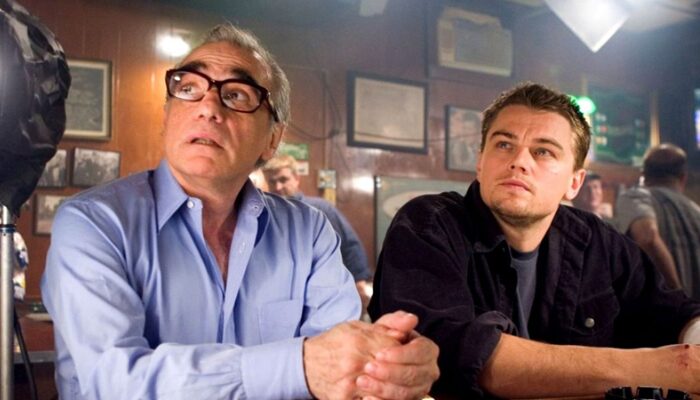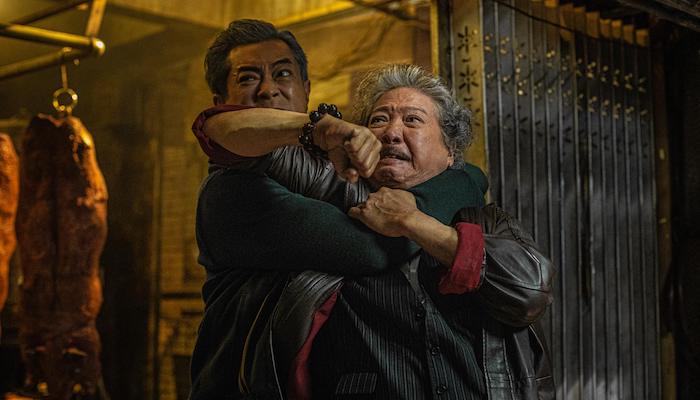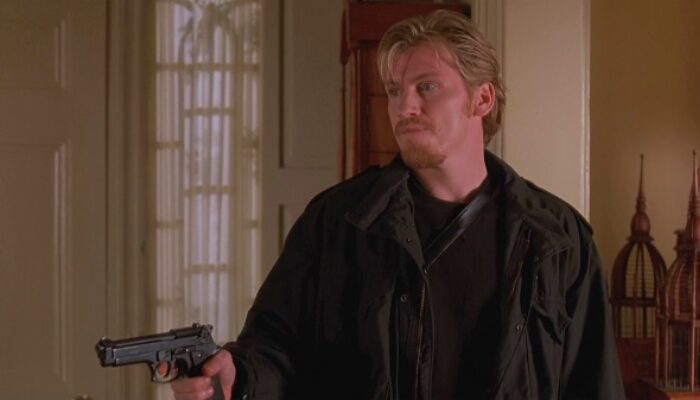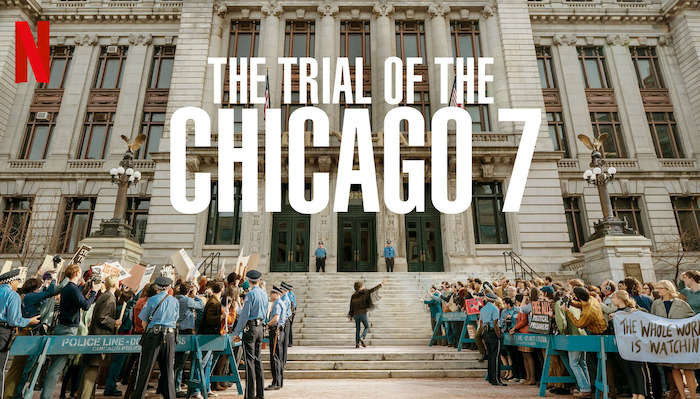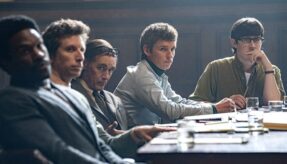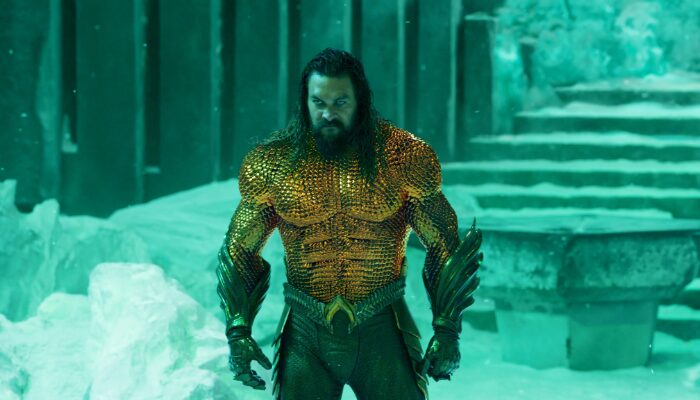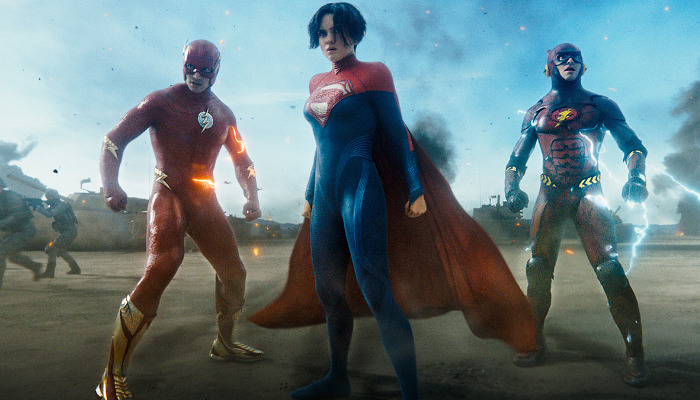Film Review: THE TRIAL OF THE CHICAGO 7 (2020): Read the Room Mr. Sorkin
The Trial of the Chicago 7 Review
The Trial of the Chicago 7 (2020) Film Review, a movie directed by Aaron Sorkin and starring, Eddie Redmayne, Sacha Baron Cohen, Jeremy Strong, Frank Langella, Yahya Abdul-Mateen II, Mark Rylance, Joseph Gordon-Levitt, and Michael Keaton.
Aaron Sorkin’s Trial of the Chicago 7 frustrates me. Despite how much I enjoyed its all star cast and production values, the film’s core message of progressive unity matches neither historical reality nor the state of politics in 2020. It’s a meek attempt to paper over a gaping ideological rift in the progressive community between pragmatic liberals and confrontational left wingers and, as a result, feels rather unsatisfying in the end. The film covers the trial of seven (originally eight) anti-war activists who came together to demonstrate outside of the 1968 Democratic National Convention in the wake of the assassinations of Dr. Martin Luther King Jr. and Bobby Kennedy earlier that year. The protestors were attacked by the Chicago police who sparked a riot that captivated the whole world. After Richard Nixon was sworn in as President, he waged an illegal campaign to harass and silence his critics and political rivals, including the anti-war demonstrators who embarrassed him at Chicago.
At a time when you might expect the defendants to have a strong sense of solidarity with each other, the simmering tensions over their differing philosophies of progressive activism boil over, and they’re soon at each other’s throats. The most obviously left wing faction of the defendants is represented by prototypical hippies Jerry Rubin and Abbie Hoffman, leaders of the Youth International Party (i.e. YIP or the Yippes) who control the media narrative through their provocative and often flippant theatrics, displaying their contempt for American politics and culture. Representing the more cautiously pragmatic side of American progressivism is Tom Hayden, who has little patience for the Yippies’ focus on style over substance. Rounding out the defendants’ bench are Rennie Davis, John Froines, Lee Weiner, pacifist David Dellinger, and Bobby Seale, the leader of the Black Panther party at the time. Though they are less pertinent to the overall message of the film in my view.
While Jeremy Strong does an excellent job playing an affable, down to earth hippie type in Jerry Rubin, the real life Rubin acted as a mean spirited provocateur to get his way politically. In a 1970 interview with Phil Donahue, Rubin refuses to answer questions directly or engage with his host in good faith, instead treating Donahue with utter contempt — mirroring today’s clashes between bookish liberals and explosive left wingers. That being said, many have argued that Rubin’s confrontational theatrics are what brought attention to issues like segregation, Nixon’s crimes in office, and the death toll in Vietnam and that without them, no transformational change would have been achieved in the 1960s. In a similar way, Sacha Baron Cohen does a great job as Abbie Hoffman. In an interview with CBS’s Tracy Smith, he describes Hoffman as someone who appears stupid from the outside but is actually “the smartest guy in the room. He developed this whole style of protesting that was designed to elicit as much media attention as possible.” says Cohen. “And even during the riots in Chicago, Abbie always had his mind on where the cameras were.”
Eddie Redmayne plays Tom Hayden as the straight man to Abbie and Jerry. Hayden passionately fights for what he believes in, though he resents them for their clownish antics, saying “My problem is, for the next 50 years, when people think of progressive politics, they’re gonna think of you … and your idiot followers passing out daisies to soldiers and trying to levitate the Pentagon. They’re not going to think of equality or justice. They’re gonna think of a bunch of stoned, lost, disrespectful, foulmouthed, lawless losers, and so we’ll lose elections.” Despite their mutual antipathy, the different progressive factions have to learn to work together lest they be torn apart by a prosecution with little regard for the rule of law.
Sorkin tries to show us that as progressives, we are all part of one big happy family with only minor differences in how we seek political change. However, this idea was as wrong then as it is now. Sorkin whitewashes the Yippies as well as Nixon’s lead prosecutor by downplaying their implicit machiavellianism. Sorkin has said he is frustrated that whenever an innocent minority or progressive activist is the victim of right wing violence, the right often excuses itself by engaging in a character assassination of the victim, which, regardless of whether it’s true or false, has no bearing on the justification of that violence. As such, Sorkin clearly does not want to take any chances with how the audience will perceive the defendants. While he has Dellinger and the Yippies drop a few token peccadilloes to assure us that this is not a left wing puff piece, the fact is that their real life counterparts would have been extremely hard to like, so Sorkin sanded off their rough edges to make them more palatable to a mainstream audience. However a savvy viewer should be able to determine their innocence despite not having any respect for the defendants. This is where Sorkin fails, because he does not seek to challenge the audience to think for themselves but instead spoonfeeds them a fairytale where everyone realizes they’re all fighting for the same thing in the end and join together in a figurative group hug.
The historical reality is that the different philosophies of progressivism have been at each other’s throats for hundreds of years now, which is especially clear in 2020. I won’t pretend to come from a place of objective neutrality here. As someone who’s approach to politics is most similar to that of Hayden, I can say from experience that the Jerry Rubins and Abbie Hoffmans of the world have nothing but contempt for people like myself despite repeated overtures from well meaning fellow liberals like Sorkin. If I have learned one lesson from radicals like Hoffman, it’s that it’s naive to try making friends with someone who only wants to use and humiliate you for their own political gain. But moderate liberals like Sorkin can’t resist the desire to find common ground, even when there is none to be found. In 2020 I can’t help but feel more cynical than that.
Rating: 7/10
Leave your thoughts on this The Trial of the Chicago 7 review and the film below in the comments section. Readers seeking to support this type of content can visit our Patreon Page and become one of FilmBook’s patrons. Readers seeking more film reviews can visit our Movie Review Page, our Movie Review Twitter Page, and our Movie Review Facebook Page. Want up-to-the-minute notifications? FilmBook staff members publish articles by Email, Twitter, Facebook, Instagram, Tumblr, Pinterest, and Flipboard.
Related Articles
FilmBook's Newsletter
Subscribe to FilmBook’s Daily Newsletter for the latest news!

